Making compost
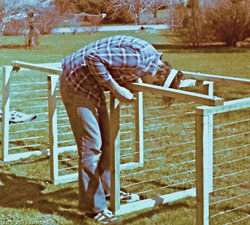 ©Janet AllenHere's John making our first compost bin 30 years ago
©Janet AllenHere's John making our first compost bin 30 years ago Compost is the key to good plant growth in our organic garden. (And since we're also concerned about climate change, it's a way to increase our soilís carbon-storage capacity.) In Central New York, we're fortunate to be able to get good quality compost at almost no cost from the two OCRRA sites (Amboy and Jamesville).
Another way we get compost is making it ourselves. Making compost goes along well with dealing with food and yard scraps in a sustainable manner. That is, composting keeps grass clippings, leaves, dead garden plants and kitchen food scraps out of the garbage (and the landfills or incinerators to which the garbage ultimately goes).
Many years ago we regularly watched Jim Crockett on the PBS show Crockett's Victory Garden. He was a big fan of compost, so we became fans, too. Who could not be after seeing yard waste and kitchen scraps magically transform into the best soil amendment and fertilizer that money can't buy!
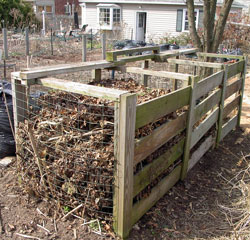 ©Janet Allen
©Janet AllenHere's our three-bin composter full of garden waste, silently becoming compost.
Inspired by Crockett, we made our first three-bin compost bin using the plans we found in his Victory Garden book. Not only did we cart the composter to our new (current) home, but we carted all its contents, too. Why waste any of this stuff (even though we wondered what our new neighbors might think)?
It served us many years before we made another one using the same plans.
Our kitchen scraps used to go into the composter but now all but our tomato, onion and citrus scraps are fed to the composting worms in our basement. We have more than enough yard waste to keep the outdoor composter full.
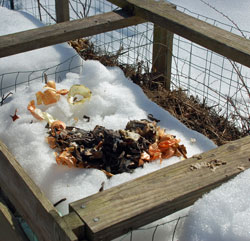 ©Janet AllenInstead of carting scraps out in the winter, it's easier to let worms do the work inside
©Janet AllenInstead of carting scraps out in the winter, it's easier to let worms do the work insideWorms in our basement now take care of most of our kitchen scraps, creating vermicompost, which is even richer in nutrients than regular compost.
This method lets us compost materials, such as old pizza, we wouldn't feel comfortable putting outside, and it's especially convenient in the winter.
The easiest compost
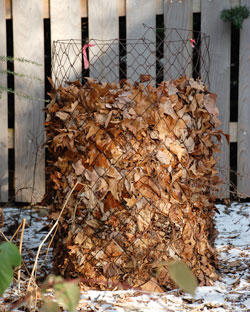 ©Janet Allen
©Janet Allen A very simple leaf bin
We also discovered how easy it is to make leaf humus. We simply formed a "barrel" with thin metal fence material, piled in the fall leaves, then waited. Unlike the Mike McGrath video (in the sidebar), however, we found that leaves composted very nicely without doing anything at all. (More on this method, as well as additional photos, in Our Habitat Garden website.)
Sifting the compost
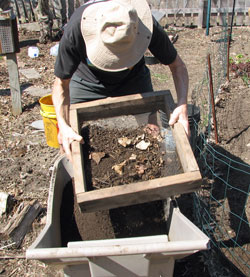 ©Janet AllenSifting compost
©Janet AllenSifting compost Quite a bit of woody material gets into our compost pile and doesn't break down as quickly as the grass, leaves and softer garden wastes. This is one method of sifting the larger stuff out of the compost. It's simply hardware cloth attached to a frame. I do this from time to time to get a bucket of fine compost which I use when planting seeds in the garden. After I put the seeds in little furrows I cover the seeds with the compost and water it. Seeds emerge more easily than if I fill the furrows with soil because our soil contains lots of little pieces of shale.
Generally, sifting isn't necessary.
Compost tea
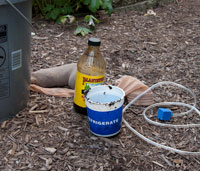 ©Janet Allen
©Janet Allen Compost tea ingredients
We're experimenting with compost tea. Our understanding is that what we're creating are the microbes that help break down the organic matter so the plants can take up the nutrients.
Our first experiment with this was to use de-chlorinated water (we used the water from our dehumidifier, but we could also have let water sit for a few days), put some regular compost and a little worm compost in an old stocking, and add a few tablespoons of organic molasses.
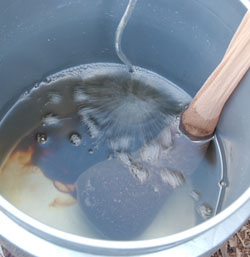 ©Janet Allen
©Janet Allen Starting to brew
We bought a small aquarium pump to aerate the mixture. We'll let it brew for about 24 hours, then use the resulting mixture within the following hour or so. It is recommended that it be used within three hours since it's a living substance.
